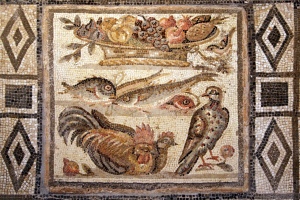True to my blowslogging persona, here comes my Easter post about Simnel cake. Until a few weeks ago, I wasn’t aware this cake even existed, but here is how I came to learn about it. Picture me pleasantly sitting at a café in one of the many London parks immersed in the green of trees and dotted with countless flowers in bloom – a symphony of colours and bird songs. I’m having a quick lunch with my friend Valerie (the idyll of the London Parks isn’t exempt from the capital’s frenetic pace and I must be back at my desk by 2pm sharp).
Valerie is a former colleague who started an Anglo-Italian group a few years ago. In passing, I need to note that she’s English to the tip of her nose or the tip of her toes depending from where you start looking. Now in her early 60’s, she has lived most of her life in North Africa, the Middle East, and South East Asia working for the British Council. Not only does she speak several languages including Arabic and Farsi, but she’s passionate about the history and culture of the countries she has lived in such as Iran and Egypt. As she’s lucky enough to live in London she regularly attends conferences and exhibitions on the subject; the Capital offers a wealth of such events attracting an international public.
The floors of Valerie’s small London house are covered with beautiful Persian carpets, and she tells me that Iranians wash them in the winter by putting them out in the snow and stamping on them. Not really possible in London as such procedure would result in the carpets becoming smeared by an unattractive mix of snowy mud and rubbishy muck.
But back to Valerie and me, chatting away in a sunny park glowing with light and green; she tells me, waving her fork with a bright orange mouthful of Cotoletta Milanese spiked on it, that she’ll soon be baking s Simnel cake. Before broaching the Simnel subject, you might have paused when I mentioned ‘bright orange Cotoletta’ since I wasn’t describing the colour of the nearby tulip beds, and since these meat loins are usually coated in delicately golden breadcrumbs. To put the Cotoletta in its historic context, I double-check on Wikipedia if Milan inherited this delicate, almost aristocratic-looking dish, from Austria as it was under Austro-Hungarian rule for more than one Century from early 1700.
Once on Wikipedia, as I hop to ‘history’ with a flick of the wrist and the mouse, I find myself caught unawares in a culinary war – one must be cautious when travelling, even when navigating the net. Both countries maintain that they invented the Cotoletta, as if there wasn’t already enough strife on the planet without such gourmet battles! However, the Wikipedia entry suggests that a Medieval Italian text mentions ‘lombos cum panitio’ (veal loin coated with breadcrumbs) which seems to settle the argument. Unless the author of this entry is from the ‘South of the Dolomites camp’?
Turning our gaze towards Valerie and her bright orange Cotoletta; it seemed to have reached her via Mumbai (rather than Milan or Vienna) with a handful of curry thrown into the mix. Perhaps the Polish chef of the small café wanted to liven up the dainty Cotoletta; and who could blame him? Isn’t curry the favourite British dish? By the way, I didn’t say a word of what was going through my mind to Valerie since she looked extremely pleased with her meal and I certainly didn’t want to spoil her enjoyment. Whenever my friends eat an Italian speciality (usually proudly ordered with an impeccable Italian accent) they appear deeply satisfied, as if they had been transported by a magic saucer to the heart of Florence, lulled by music played by the nymphs of culture and beauty. I’d be heartless if I woke them up from their dream!
So, Valerie tells me that she’s going to bake a Simnel cake at the weekend. She explains that traditionally it was baked on Mid-Lent Sunday (coinciding with Mothering Sunday) and that the left-overs were stored in a cupboard to be eaten at Easter; this is why it has come to be known as an ‘Easter cake’. It keeps for several weeks because its main ingredients, like those of other English celebratory cakes, are dried fruit and marzipan. I’m very fond of dried fruit and marzipan but if I were to give a British cake a personality it would be that of a ‘square’, good-natured fellow on whom nuances are rather lost. Whereas if a personality were to be given to Italian cakes like Profiteroles, it would probably be that of a refined, cultured lady with a witty repartee. Clearly the culinary traditions of the two countries are far from telling the full story of their national character; perhaps they simply reveal a few broad traits.
Valerie adds that in her family the tradition of baking a Simnel cake was passed down through the generations and that when her mother felt that she had baked enough Simnels in her lifetime, she asked Valerie to take over in the same way that Valerie’s grandmother had done in her time. I’m in awe of such culinary tradition since I’ve hardly come across this before. The only vaguely similar instance I’ve met is that of my grandmother Eva’s hand-written cookery book which she inherited from her mother-in-law. I might have mentioned Eva before – she was born at the beginning of the 20th Century in Brno, then also a part of the far-reaching Astro-Hungarian Empire.
This means that the recipe book is written in German which makes it very difficult to understand as I can’t read the handwriting and I don’t speak the language. As for my immediate family, my mother has always harboured a great dislike of cooking and she was known for ‘burning everything, even ice-cream’; luckily she didn’t try her hand in the kitchen too often for lack of inclination and time.
In order to turn the Simnel into an Easter cake, a few chocolate eggs and fluffy chicklets would be added on top. I think that one of the reasons why today it is best known as an Easter cake is that our deeply secular society has forgotten the meaning of Lent, let alone mid-Lent, the day when Lenten rules of fasting and self-denial were relaxed to offer some relief to religious people (I had almost forgotten that mid-Lent existed before writing this post). As for Easter, it’s a jolly day when we go on egg-hunts and we eat a belly-full of cute chocolate beasties. On the one hand we often aren’t interested in topics and values which require time and effort to understand and to make as part of our lives, and on the other we are far too busy to pause and think about the transcendental meaning of our existence. Quoting Lady Markby in An Ideal Husband, ‘we all scramble and jostle so much nowadays’, and at the dawn of the 21st Century we ‘scramble and jostle’ at digital speed!
I wonder if this English habit of ‘reusing cakes’ – my sister-in-law tells me that a similar tradition is true of wedding cakes whose left-overs are kept for the first child’s christening – points to two typical indigenous traits; pragmatism and parsimony. Why spend more time and effort baking a new cake if you’ve already got one? And why spend more money? I’ll write a whole post about spending habits in the two countries some other time, but perhaps the pragmatism of the English also informs their attitude to money which they perceive as a concrete entity not as an abstract figure. So, a pound is made of one hundred pennies and ten pounds of ten pound coins, no more no less. You can’t stretch money and adapt it to your present wishes or needs in the same way that a stone or a plank of wood can’t change their shape.
We’re reminded of kind-hearted if naïve Mr Micawber (another very British character, the creation of a towering British genius), ‘annual income twenty pounds, annual expenditure nineteen pounds nineteen and six, result happiness. Annual income twenty pounds, annual expenditure twenty pounds nought and six, result misery.’ Every single shilling matters.
Many years ago I saw a TV programme featuring a shopkeeper who pretended to have run out of pennies as change for his customers while a hidden camera filmed their reaction. Most of them, women and men, young and old, claimed their penny and made their disappointment clear. This would be an unlikely scenario in Italy since Italians would mostly perceive a penny as of no value and therefore not worth being bothered about.
To conclude this rather inconclusive post about Simnel cakes, culinary traditions, and national traits, I peruse the Wikipedia’s entry for ‘wedding cakes’. This tradition too, like that of the Cotoletta Milanese (allegedly), was started in Italy; all culinary roads lead to Rome! Wikipedia explains that in Ancient Rome some special bread (the ancestor of today’s more sophisticated cake) was broken over the bride’s head to bring good fortune to the newly-weds. I’m not sure what the bride thought about this custom, but perhaps it was meant as a symbol of future marital storms occasionally interfering with marital bliss.



